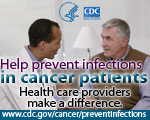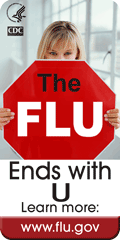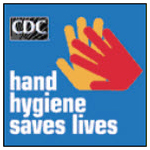Cancer, the Flu, and You
What Cancer Patients, Survivors, and Caregivers Should Know About the Flu
Living with cancer increases your risk for complications from influenza ("flu"). If you have cancer now or have had cancer in the past, you are at higher risk for complications from the seasonal flu or influenza, including hospitalization and death.
To help prepare you for the flu this season, CDC answers some of your most important questions about special considerations for cancer patients, survivors, and caregivers for the flu.
- What should adult cancer patients and survivors know about this flu season?
- I had cancer in the past, but I do not have cancer now. Does this information apply to me?
- Are cancer patients and survivors more likely to get the flu than others?
- Should cancer patients and survivors get a flu shot?
- What other vaccines should cancer patients and survivors be aware of?
- What can cancer patients and survivors do to reduce the spread of the flu?
- What are the symptoms of the flu?
- What should cancer patients and survivors do if they think they may have the flu?
- I live with or provide care for a cancer patient or survivor. What do I need to know about the flu?
- Is there treatment for the flu?
- When should cancer patients and survivors be prescribed antiviral drugs to prevent the flu?
What should adult cancer patients and survivors know about this flu season?
"Flu" refers to illnesses caused by a number of different influenza viruses. Flu can cause a range of symptoms and effects, from mild to deadly. Some people, including cancer patients and survivors, are more likely to get flu complications that could result in hospitalization and death. For the latest information, visit 2012–2013 Flu Season.2012–2013 Flu Season.
I had cancer in the past, but I do not have cancer now. Does this information apply to me?
Yes. If you had cancer in the past, you are at higher risk for complications from flu, even if you are free from cancer now.
Are cancer patients and survivors more likely to get the flu than others?
We do not know if cancer patients and survivors are at greater risk for infection with flu. However, we do know that cancer patients and survivors are at higher risk for complications from flu, including hospitalization and death.
Should cancer patients and survivors get a flu shot?
Yes. People with cancer or a history of cancer should receive the seasonal flu shot. People with cancer should NOT receive the nasal spray vaccine. The flu shot is made up of inactivated (killed) viruses, and the nasal spray vaccines are made up of live viruses. The flu shot is safer for those with a weakened immune system.
People who live with or care for cancer patients and survivors also should be vaccinated against seasonal flu.vaccinated against seasonal flu. Additionally, CDC recommends that everyone aged six months and older get a flu vaccine for the upcoming season.
This year, there are no separate vaccines for H1N1 and seasonal flu. Every year a different flu vaccine is developed to match the constantly changing flu strains that circle the globe. This year's vaccine is an all-in-one flu shot that protects against the swine flu strain (H1N1) plus two other kinds of influenza: an H3N2 virus and an influenza B virus. Getting a flu shot as soon as it becomes available each year is always a good idea, and the protection you get from vaccination will last throughout the flu season.
What other vaccines should cancer patients and survivors be aware of?
Many people in at-risk groups also should get a pneumococcal pneumonia shot. People with cancer or other diseases that compromise your immune system should ask their health care providers if two pneumococcal pneumonia shots are needed.
Fluzone High-Dose is a new flu vaccine manufactured by Sanofi Pasteur Inc. specifically for people who are 65 years of age and older. Immune defenses become weaker with age, which places older people at greater risk of severe illness from flu. Also, aging decreases the body's ability to have a good immune response after getting a flu shot. A higher dose of antigen in the vaccine is supposed to give older people a better immune response and better protection against flu.
What can cancer patients and survivors do to help reduce the spread of the flu?
- Take time to get a flu vaccine.
- Develop good health habits to stop the spread of germs.
- Cover your nose and mouth with a tissue when you cough or sneeze. Throw the tissue in the trash after you use it.
- Wash your hands often with soap and water. If soap and water are not available, use an alcohol-based hand sanitizer.
- Avoid touching your eyes, nose, or mouth. Germs spread this way.
- Try to stay at least six feet away from people who appear ill.
- If you are sick with flu-like illness, stay home for at least 24 hours after your fever is gone except to get medical care or for other necessities. Your fever should be gone without the use of a fever-reducing medicine. Keep away from others as much as possible to keep from making them sick.
- Follow public health advice regarding school closures, avoiding crowds, and other social distancing measures.
- Be prepared in case you get sick with a supply of over-the-counter medicines, alcohol-based hand sanitizer, and tissues.
- Take flu antiviral drugs if your doctor prescribes them.
Other important steps to take include—
- Stay informed by visiting CDC's Flu siteCDC's Flu site often.
- Develop a plan in advance with your doctor about what to do if you get sick (when you should call your doctor, whether you will need antiviral medication, and how to get a prescription for antiviral medication quickly if needed).
- Make sure your vaccinations are up-to-date.
- Keep a written record of the type of cancer you have, treatment you have received and when you received it, the name and contact information for your doctor, and a list of medicines you are taking.
What are the symptoms of the flu?
Symptoms of the flu include fever, cough, sore throat, runny or stuffy nose, body aches, headache, chills, and fatigue. Some people may have vomiting and diarrhea. People may be infected with the flu and have respiratory symptoms without a fever. For more information, visit Flu Symptoms and Severity.Flu Symptoms and Severity.
What should cancer patients and survivors do if they think they may have the flu?
If you have received cancer treatment such as chemotherapy and/or radiation therapy within the last month, or have a blood or lymphatic form of cancer, call your doctor immediately if you get flu symptoms. Learn how to prevent infections while you're receiving chemotherapy.
All cancer patients and survivors should follow the steps below.
- Contact your health care provider and follow his or her instructions.
- Stay home and away from others as much as possible to keep from making them sick. This means you should avoid public activities, including work, school, travel, shopping, social events, and public gatherings. You should stay home for at least 24 hours after your fever is gone (without the use of fever-reducing medicine), except to get medical care or other necessities.
- If you need to go to the doctor's office, emergency room, or any other health care facility, cover your mouth and nose with a facemask, if available and tolerable, or cover your mouth and nose with a tissue when coughing or sneezing. Let the facility's staff know you are there because you think you may have the flu.
For more information, visit Seasonal Flu: What to Do If You Get Sick.
I live with or provide care for a cancer patient or survivor. What do I need to know about the flu?
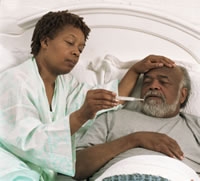
People with flu can spread it to others up to about six feet away. Most experts think that flu viruses are spread mainly by droplets made when people with flu cough, sneeze, or talk. These droplets can land in the mouths or noses of people who are nearby or be inhaled into their lungs. Less often, a person might also get flu by touching a surface or object that has flu virus on it and then touching their own mouth or nose.
Most healthy adults may be able to infect others beginning the day before symptoms develop and five to seven days after becoming sick. That means that you may be able to pass on the flu to someone else before you know you are sick, as well as while you are sick. For more information, learn How Flu Spreads.How Flu Spreads.
Since cancer patients and survivors are at higher risk for complications from the flu, including hospitalization and death, please take the following precautions to help avoid spreading the flu.
- Get a flu shot. CDC recommends a yearly flu vaccine as the first and most important step in protecting against flu viruses.
- Help stop the spread of germs by covering your nose and mouth with a tissue when you cough or sneeze, washing your hands or using hand sanitizer often, avoiding close contact with sick people, and limiting contact with others as much as possible if you get sick.
If you are caring for a cancer patient or survivor who has the flu, please visit The Flu: Caring for Someone Sick at Home for detailed information about how to care for the sick person while avoiding getting sick yourself.
If you have a child with cancer, read Flu: A Guide for Parents of Children or Adolescents with Chronic Health Conditions [PDF-164KB].
Is there treatment for the flu?
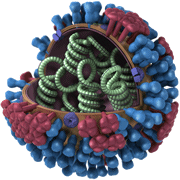
Yes. CDC recommends oseltamivir or zanamivir antiviral drugs to treat and prevent infection. Antiviral drugs are prescription medicines (pills, liquid, or an inhaled powder) that stop flu viruses from reproducing in your body. If you get sick, antiviral drugs can make your illness milder and make you feel better faster. They may also prevent serious flu complications.
It's very important that antiviral drugs be used early to treat flu in people who are very sick with flu (for example, people who are in the hospital) and people who are sick with flu and have a greater chance of getting serious flu-related complications, including cancer patients and survivors.
When should cancer survivors be prescribed antiviral drugs to prevent the flu?
If you have received cancer treatment such as chemotherapy and/or radiation therapy within the last month, or have a blood or lymphatic form of cancer, call your doctor immediately if you have been within six feet of someone known or suspected to have the flu. Your doctor may give you antiviral drugs to help prevent the flu.
If you have cancer and have not received treatment within the last month, or you have had cancer in the past but are cancer-free now, and you have had close contact with someone known or suspected to have the flu, call your doctor and ask if you should receive antiviral drugs.
Flu Publications

My health is my biggest asset [PDF-236KB]
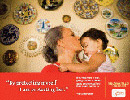
By protecting myself, I am protecting her [PDF-249KB]

Are you at risk for serious complications from flu? [PDF-274KB]

Shots aren't just for kids. [PDF-1MB]

What you should know about flu antiviral drugs [PDF-656KB]

Guide for Parents of Children with Chronic Health Conditions [PDF-164KB]
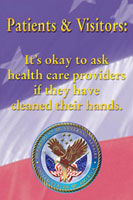
Contact Us:
- Centers for Disease Control and Prevention
Division of Cancer Prevention and Control
4770 Buford Hwy NE
MS K-64
Atlanta, GA 30341 - 800-CDC-INFO
(800-232-4636)
TTY: (888) 232-6348 - cdcinfo@cdc.gov







